仁爱英语总复习
- 格式:doc
- 大小:638.00 KB
- 文档页数:274
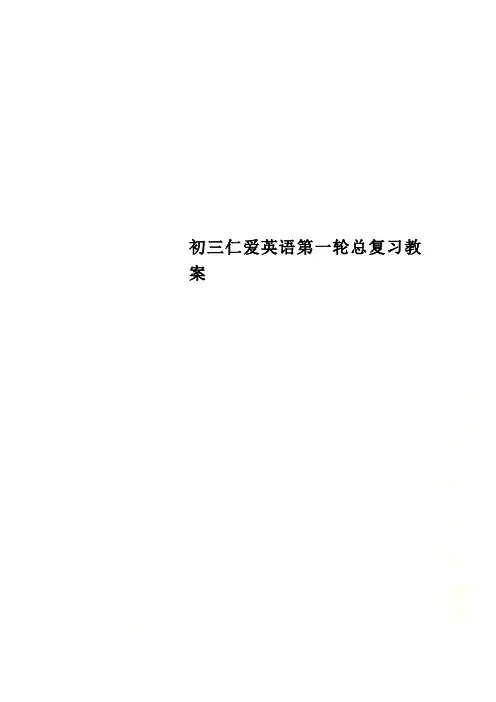
初三仁爱英语第一轮总复习教案2. right away 立刻,马上3. dark skin 黑皮肤light yellow skin 黄皮肤 fair skin 白皮肤4. the boy over there 在那边的那个男孩 the boy under the tree 在树下的那个男孩5.look like 看起来像look the same 看起来一样6. different looks 不同的外表7. good friends 好朋友 8. look at the picture 看着图片9. the pair of shoes / trousers 这双鞋/裤子10. 表示颜色的词语11. 关于颜色的提问:What color…?-- What color is the skirt? -- It’s white.-- What color are the shirts? - They are white.12. which疑问词的使用Which girl? The girl in red. 哪个女孩?穿红色衣服的那个女孩。
Which bag? The blue one. 哪个包?蓝色那个。
13. What does she look like? 她看起来怎么样?14. 区别以下两种问题:Mike’s pants are blue.What color are Mike’s pants?The blue pants are Mike’s.Which pants are Mike’s?15. Which color / bag / clothes do you like? 你喜欢哪种颜色/哪个包/哪件衣服?These are my favorite clothes. 这些是我最喜欢的衣服。
Topic 3 Whose jacket is this?词汇和重点句型:1. What does she / he look like?She is young with long legs. / He is short with black hair.2. Is the boy tall or short? He’s short.注意:选择疑问句的选择部分前部分要读升调,后部分读降调。
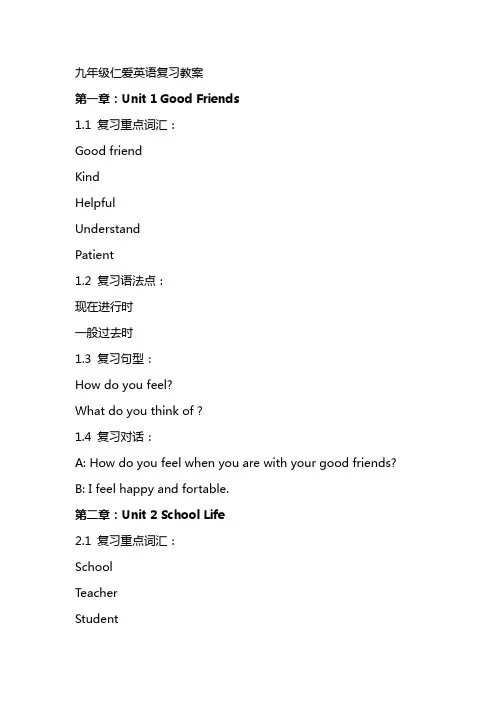
九年级仁爱英语复习教案第一章:Unit 1 Good Friends1.1 复习重点词汇:Good friendKindHelpfulUnderstandPatient1.2 复习语法点:现在进行时一般过去时1.3 复习句型:How do you feel?What do you think of ?1.4 复习对话:A: How do you feel when you are with your good friends? B: I feel happy and fortable.第二章:Unit 2 School Life2.1 复习重点词汇:SchoolTeacherStudentClassroomHomework2.2 复习语法点:一般现在时一般过去时2.3 复习句型:What does he/she look like?What does he/she do?2.4 复习对话:A: What does your teacher look like? B: My teacher is tall and thin.第三章:Unit 3 Colors3.1 复习重点词汇:ColorRedBlueGreenYellow3.2 复习语法点:一般现在时一般过去时3.3 复习句型:What color is it?I like3.4 复习对话:A: What color is your favorite? B: My favorite color is blue.第四章:Unit 4 Seasons4.1 复习重点词汇:SeasonSpringSummerAutumnWinter4.2 复习语法点:一般现在时一般过去时4.3 复习句型:What season is it?I like season.4.4 复习对话:A: What season is your favorite? B: My favorite season is spring. 第五章:Unit 5 FoodFoodRiceMeatVegetableFruit5.2 复习语法点:一般现在时一般过去时5.3 复习句型:What do you like to eat?Do you like?5.4 复习对话:A: What do you like to eat?B: I like to eat rice and vegetables. 第六章:Unit 6 Animals6.1 复习重点词汇:AnimalCatDogFishBird一般现在时一般过去时6.3 复习句型:What animal do you like? Does it like?6.4 复习对话:A: What animal do you like? B: I like dogs.第七章:Unit 7 Clothing 7.1 复习重点词汇:ClothingShirtPantsDressSkirt7.2 复习语法点:一般现在时一般过去时7.3 复习句型:What clothes do you like? What size do you wear?A: What clothes do you like? B: I like shirts and pants.第八章:Unit 8 Health8.1 复习重点词汇:HealthDoctorHospitalMedicineExercise8.2 复习语法点:一般现在时一般过去时8.3 复习句型:How are you?Do you need?8.4 复习对话:A: How are you?B: I'm fine, thank you.第九章:Unit 9 Travel9.1 复习重点词汇:TravelPlaceVisitTouristGuidebook9.2 复习语法点:一般现在时一般过去时9.3 复习句型:Where do you want to go?Do you want to?9.4 复习对话:A: Where do you want to go? B: I want to visit the Great Wall. 第十章:Unit 10 Nature10.1 复习重点词汇:NatureTreeFlowerSunMoon10.2 复习语法点:一般现在时一般过去时10.3 复习句型:What do you like about nature? Does it like?10.4 复习对话:A: What do you like about nature? B: I like the beautiful flowers and trees. 第十一章:Unit 11 Science11.1 复习重点词汇:ScienceExperimentTheoryScientistDiscovery11.2 复习语法点:一般现在时一般过去时11.3 复习句型:What is science?What discovery didmake?11.4 复习对话:A: What is science?B: Science is the study of the natural world. 第十二章:Unit 12 Technology12.1 复习重点词汇:TechnologyComputerInternetMobile phoneInvention12.2 复习语法点:一般现在时一般过去时12.3 复习句型:What technology do you like?How does technology affect?12.4 复习对话:A: What technology do you like?B: I like smartphones and the internet.第十三章:Unit 13 Environment13.1 复习重点词汇:EnvironmentPollutionRecyclingNatureConservation13.2 复习语法点:一般现在时一般过去时13.3 复习句型:What is the environment?How can we protect?13.4 复习对话:A: What is the environment?B: The environment is everything around us. 第十四章:Unit 14 Culture14.1 复习重点词汇:CultureTraditionFestivalArtLanguage14.2 复习语法点:一般现在时一般过去时14.3 复习句型:What is culture?What is your favorite?14.4 复习对话:A: What is culture?B: Culture is the way of life for a group of people.第十五章:Unit 15 Self-study15.1 复习重点词汇:Self-studyHabitSkillImprovementGoal15.2 复习语法点:一般现在时一般过去时15.3 复习句型:What is self-study?How can we improve?15.4 复习对话:A: What is self-study?B: Self-study is studying yourself to achieve your goals. 重点和难点解析重点词汇:每个章节中出现的重点词汇,如“good friend”、“school life”、“colors”、“seasons”、“food”等。
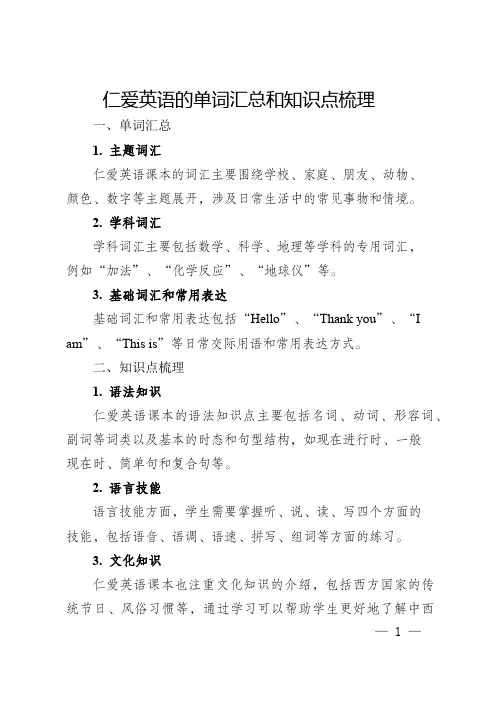
仁爱英语的单词汇总和知识点梳理
一、单词汇总
1. 主题词汇
仁爱英语课本的词汇主要围绕学校、家庭、朋友、动物、
颜色、数字等主题展开,涉及日常生活中的常见事物和情境。
2. 学科词汇
学科词汇主要包括数学、科学、地理等学科的专用词汇,
例如“加法”、“化学反应”、“地球仪”等。
3. 基础词汇和常用表达
基础词汇和常用表达包括“Hello”、“Thank you”、“I am”、“This is”等日常交际用语和常用表达方式。
二、知识点梳理
1. 语法知识
仁爱英语课本的语法知识点主要包括名词、动词、形容词、副词等词类以及基本的时态和句型结构,如现在进行时、一般
现在时、简单句和复合句等。
2. 语言技能
语言技能方面,学生需要掌握听、说、读、写四个方面的
技能,包括语音、语调、语速、拼写、组词等方面的练习。
3. 文化知识
仁爱英语课本也注重文化知识的介绍,包括西方国家的传统节日、风俗习惯等,通过学习可以帮助学生更好地了解中西
— 1 —
方文化的差异。
总的来说,仁爱英语的知识点涵盖了语言知识、语法知识、语言技能和文化知识等方面,对于提高学生的英语水平有着重要的作用。
在学习过程中,学生需要注意积累词汇和练习语法知识,同时注重培养听、说、读、写各方面的技能,以及了解中西方文化的差异和文化背景知识。
— 2 —。
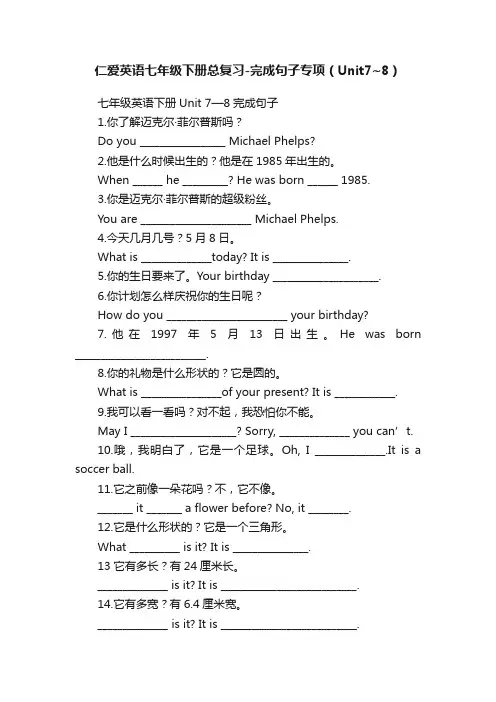
仁爱英语七年级下册总复习-完成句子专项(Unit7~8)七年级英语下册Unit 7—8完成句子1.你了解迈克尔·菲尔普斯吗?Do you _________________ Michael Phelps?2.他是什么时候出生的?他是在1985年出生的。
When ______ he _________? He was born ______ 1985.3.你是迈克尔·菲尔普斯的超级粉丝。
You are ______________________ Michael Phelps.4.今天几月几号?5月8日。
What is ______________today? It is _______________.5.你的生日要来了。
Your birthday _____________________.6.你计划怎么样庆祝你的生日呢?How do you ________________________ your birthday?7.他在1997年5月13日出生。
He was born __________________________.8.你的礼物是什么形状的?它是圆的。
What is ________________of your present? It is ____________.9.我可以看一看吗?对不起,我恐怕你不能。
May I _____________________? Sorry, ______________ you can’t.10.哦,我明白了,它是一个足球。
Oh, I ______________.It is a soccer ball.11.它之前像一朵花吗?不,它不像。
_______ it _______ a flower before? No, it ________.12.它是什么形状的?它是一个三角形。
What __________ is it? It is _______________.13它有多长?有24厘米长。
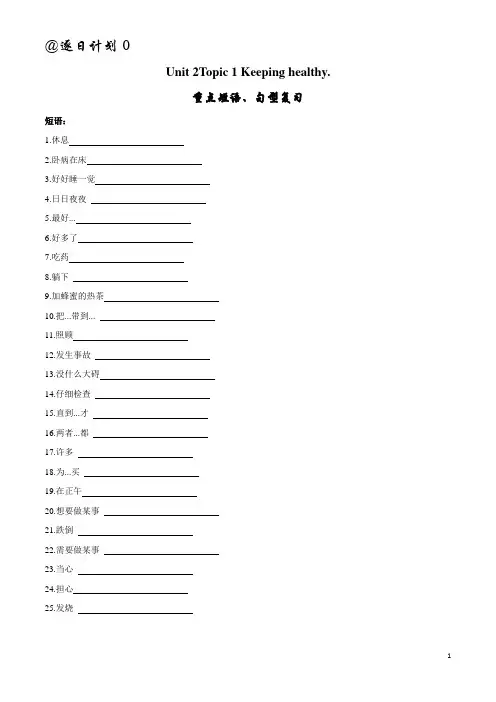
Unit 2Topic 1 Keeping healthy.重点短语、句型复习短语:1.休息2.卧病在床3.好好睡一觉4.日日夜夜5.最好...6.好多了7.吃药8.躺下9.加蜂蜜的热茶10.把...带到...11.照顾12.发生事故13.没什么大碍14.仔细检查15.直到...才16.两者...都17.许多18.为...买19.在正午20.想要做某事21.跌倒22.需要做某事23.当心24.担心25.发烧句型:1. What`s wrong with you/him/her?你/他/她怎么了?2.You should see a dentist.你应该去看牙医。
这是一种表达建议的句子。
还可以用以下句式:you`d3.I`m sorry to hear that.听到这个消息我很难过。
4.You look pale.你看起来很苍白。
5.------Shall I take you to the hospital?我送你去医院吧?-------No,thank you.不用,谢谢。
6. I`ll take some medicine and see how it goes. 我打算先吃药看看情况再说。
7.You`d better drink hot tea with honey.你最好喝加蜂蜜的热茶。
8.Michael had an accident yesterday.昨天迈克发生了事故。
9.But my left leg still hurts when I move it.可是当我挪动脚时,还是有点儿疼。
10.Your X-rays show it`s nothing serious.你的X光照片显示没什么严重的问题。
11.Stay in bed and don`t move your leg too much.躺在床上,不要总是挪动你的腿。
12.Michael`s friends bought some chocolate for him .迈克的朋友给他买饿一些巧克力。
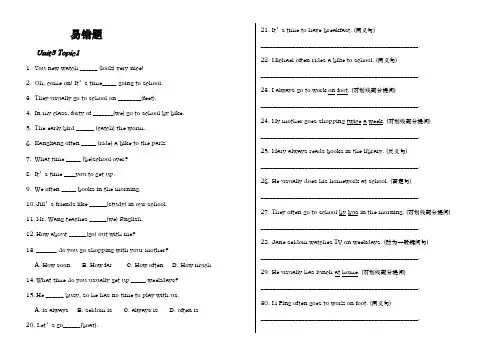
易错题Unit5 Topic11.You new watch ______ (look) very nice!2.Oh, come on! It’s time_____ going to school.3.They usually go to school on ________(feet).4.In my class, forty of _______(we) go to school by bike.5.The early bird ______ (catch) the worm.6.Kangkang often _____ (ride) a bike to the park.7.What time _____ (be)school over?8.It’s time ____you to get up.9.We often _____ books in the morning.10.Jill’s friends like ______(study) in our school.11.Mr. Wang teaches ______(we) English.12.How about ______(go) out with me?13._______ do you go shopping with your mother?A. How soonB. How farC. How oftenD. How much14.What time do you usually get up _____ weekdays?15.He ______ busy, so he has no time to play with us.A. is alwaysB. seldom isC. always isD. often is20. Let’s go______(boat). 21. It’s time to have breakfast. (同义句)______________________________________________________.22. Michael often rides a bike to school. (同义句)______________________________________________________.23. I always go to work on foot. (对划线部分提问)______________________________________________________.24. My mother goes shopping twice a week. (对划线部分提问)______________________________________________________.25. Mary always reads books in the library. (反义句)______________________________________________________.26. He usually does his homework at school. (否定句)______________________________________________________.27. They often go to school by bus in the morning. (对划线部分提问) ______________________________________________________.28. Jane seldom watches TV on weekdays. (改为一般疑问句)______________________________________________________.29. He usually has lunch at home. (对划线部分提问)______________________________________________________.30. Li Ping often goes to work on foot. (同义句)______________________________________________________.31. 几乎没有学生乘地铁去学校。
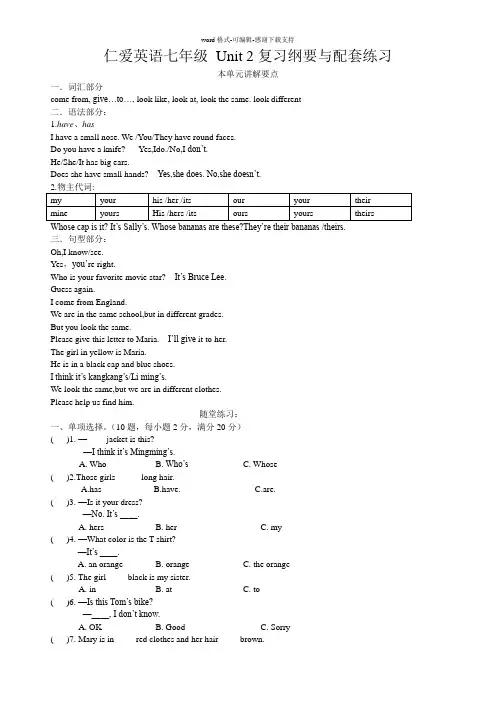
仁爱英语七年级Unit 2复习纲要与配套练习本单元讲解要点一.词汇部分come from, give…to…, look like, look at, look the same. look different二.语法部分:1.have、hasI have a small nose. We /You/They have round faces.Do you have a knife? Yes,Ido./No,I don’t.He/She/It has big ears.Does she have small hands? Yes,she does. No,she doesn’t.Whose cap is it? It’s Sally’s. Whose bananas are these?They’re their bananas /theirs.三.句型部分:Oh,I know/see.Yes,you’re right.Who is your favorite movie star? It’s Bruce Lee.Guess again.I come from England.We are in the same school,but in different grades.But you look the same.Please give this letter to Maria. I’ll give it to her.The girl in yellow is Maria.He is in a black cap and blue shoes.I think it’s kangkang’s/Li ming’s.We look the same,but we are in different clothes.Please help us find him.随堂练习:一、单项选择。
(10题,每小题2分,满分20分)( )1. —____ jacket is this?—I think it’s Mingming’s.A. WhoB. Who’sC. Whose( )2.Those girls _____ long hair.A.hasB.have.C.are.( )3. —Is it your dress?—No. It’s ____.A. hersB. herC. my( )4. —What color is the T-shirt?—It’s ____.A. an orangeB. orangeC. the orange( )5. The girl ____ black is my sister.A. inB. atC. to( )6. —Is this Tom’s bike?—____, I don’t know.A. OKB. GoodC. Sorry( )7. Mary is in ____ red clothes and her hair ____ brown.A. /; isB. a; areC. /; are( )8. —Do you look like your sister?—No, we ____.A. look the sameB. look differentC. look like( )9. —You are nice in this dress.—____A. It’s right.B. No, it isn’t.C. Thank you.( )10.-What does your brother look like?-She has _____nose.A.a big red B .a red big C.red big二、词汇运用。
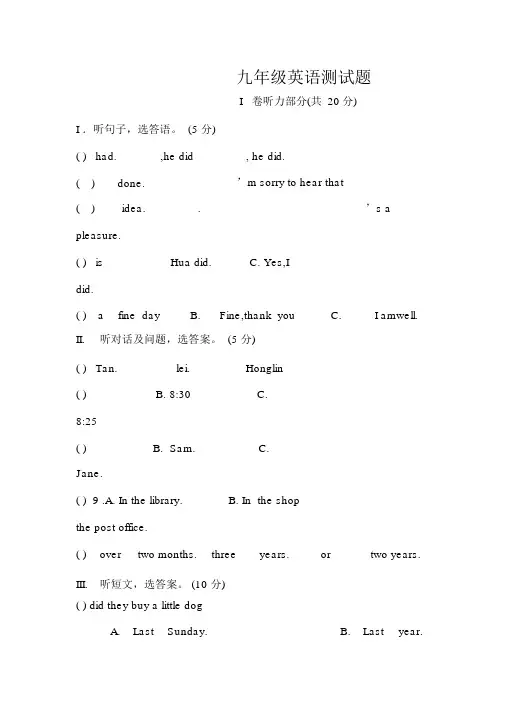
九年级英语测试题I卷听力部分(共20分)I .听句子,选答语。
(5 分)( )had.,he did, he did.()done.’m sorry to hear that()idea..’s a pleasure.( )is Hua did. C. Yes,Idid.( )a fine day B.Fine,thank you C.I amwell. II.听对话及问题,选答案。
(5 分)( )Tan.lei.Honglin( ) B. 8:30 C.8:25( ) B. Sam. C.Jane.( )9 .A. In the library. B. In the shopthe post office.( )over two months.three years.or two years.III.听短文,选答案。
(10 分)( ) did they buy a little dogA. Last Sunday.B. Last year.month( ) did they buy a little dogA. Because her daughter loves a dog.B. Because her daughter doesn’t have any friends.C.Because they are rich.( ) many children do they haveone daughter. B.Two daughter.dog and a daughter( ) did the man stop smokingA. Because of his wifeB.Because of his daughter. ofhis dog.( ) of the following is trueA.It ’s easier to look after the girl. dog is alwaysvery clean.B.They have to wash a lot of dirty clothes fortheir daughter.笔试部分(100分)IV. 选择填空。
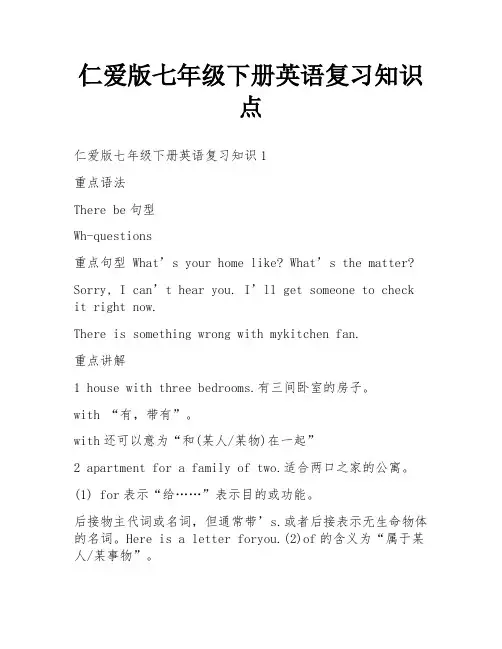
仁爱版七年级下册英语复习知识点仁爱版七年级下册英语复习知识1重点语法There be句型Wh-questions重点句型What’s your home like? What’s the matter?Sorry, I can’t hear you. I’ll get someone to check it right now.There is something wrong with mykitchen fan.重点讲解1 house with three bedrooms.有三间卧室的房子。
with “有,带有”。
with还可以意为“和(某人/某物)在一起”2 apartment for a family of two.适合两口之家的公寓。
(1) for表示“给……”表示目的或功能。
后接物主代词或名词,但通常带’s.或者后接表示无生命物体的名词。
Here is a letter foryou.(2)of的含义为“属于某人/某事物”。
She is a friend of Lily’s. = She is Lily’s friend.3 What’s the matter?怎么了?该句常用来询问某或某物出了什么什么问题或毛病;询问具体某人或某物出了什么问题时,还可以表达为:What’s the matter with sb./sth.某人或某物出了什么毛病。
What’s the matter? = What’swrong?4 Ihear you playing the piano.我听见你在弹钢琴。
hear…doing sth.“听见……在做某事”,强调正在进行的动作。
hear…dosth.“听见……做了某事”,强调全过程。
hearabout sth.听到关于某事物的消息 hear from sb.接到某人的来信、电话等hear of sb./sth.听到或知道某人或某事物的情况5 a lot of = lots of许多后接可数名词,相当于many;后接不可数名词,相当于much,用于肯定句中;但是注意:如果是否定句,则常用many或much.6 be far from… 离……远(抽象距离)be…away from…离……远(具体距离)My school is not far from thebookstore. The sea is 2 miles away fromthe hotel.7 There is something wrong with sb./sth.某人或某物出问题/有毛病了。
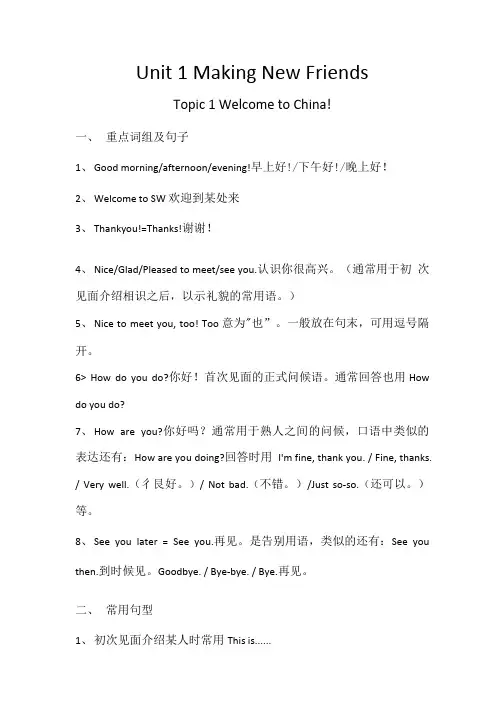
Unit 1 Making New FriendsTopic 1 Welcome to China!一、重点词组及句子1、Good morning/afternoon/evening!早上好!/下午好!/晚上好!2、Welcome to SW 欢迎到某处来3、Thankyou!=Thanks!谢谢!4、Nice/Glad/Pleased to meet/see you.认识你很高兴。
(通常用于初次见面介绍相识之后,以示礼貌的常用语。
)5、Nice to meet you, too! Too意为"也”。
一般放在句末,可用逗号隔开。
6> How do you do?你好!首次见面的正式问候语。
通常回答也用How do you do?7、How are you?你好吗?通常用于熟人之间的问候,口语中类似的表达还有:How are you doing?回答时用I'm fine, thank you. / Fine, thanks. / Very well.(彳艮好。
)/ Not bad.(不错。
)/Just so-so.(还可以。
)等。
8、See you later = See you.再见。
是告别用语,类似的还有:See you then.到时候见。
Goodbye. / Bye-bye. / Bye.再见。
二、常用句型1、初次见面介绍某人时常用This is......2、自我介绍用I'm xxx.3、询问对方是不是某人用Are you xxx?肯定回答用:Yes, I am.(注意不能缩写)否定回答用:No, Tin not.三、语法要点1、Be动词的用法Be动词有三个am, is, are。
Am只能跟I搭配;is用于单数主语的后面he, she , it或是xxx; are用于复数主语的后面you, they, we.2、一般疑问句的用法如何将陈述句改为一般疑问句(1)如果句中有Be动词或是情态动词can, could, will, would, may等直接把Be动词或情态动词提到句首。
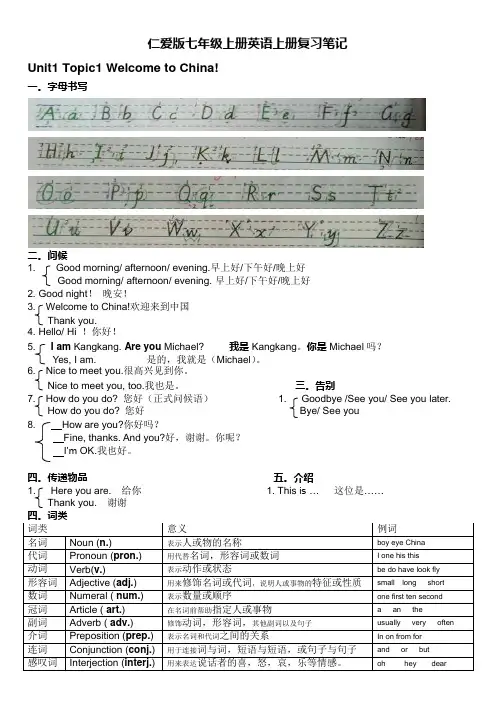
仁爱版七年级上册英语上册复习笔记Unit1 Topic1 Welcome to China!一。
字母书写二。
问候1. Good morning/ afternoon/ evening.早上好/下午好/晚上好Good morning/ afternoon/ evening. 早上好/下午好/晚上好2. Good night!晚安!3. Welcome to China!欢迎来到中国Thank you.4. Hello/ Hi !你好!5. I am Kangkang. Are you Michael? 我是Kangkang。
你是Michael 吗?Y e s, I am. 是的,我就是(M ichael)。
6. Nice to meet you.很高兴见到你。
Nice to meet you, too.我也是。
三。
告别7. How do you do? 您好(正式问候语) 1. Goodbye /See you/ See you later.How do you do? 您好Bye/ See you8. How are you?你好吗?Fine, thanks. And you?好,谢谢。
你呢?I’m OK.我也好。
四。
传递物品五。
介绍1. Here you are. 给你 1. This is …这位是……Thank you. 谢谢四。
词类词类意义例词名词Noun (n.) 表示人或物的名称boy eye China代词Pronoun (pron.) 用代替名词,形容词或数词I one his this动词Verb(v.) 表示动作或状态be do have look fly形容词Adjective (adj.) 用来修饰名词或代词,说明人或事物的特征或性质small long short 数词Numeral ( num.) 表示数量或顺序one first ten second冠词Article ( art.) 在名词前帮助指定人或事物 a an the副词Adverb ( adv.) 修饰动词,形容词,其他副词以及句子usually very often 介词Preposition (prep.) 表示名词和代词之间的关系In on from for连词Conjunction (conj.) 用于连接词与词,短语与短语,或句子与句子and or but感叹词Interjection (interj.) 用来表达说话者的喜,怒,哀,乐等情感。
仁爱英语九年级上册知识点Unit 1: The Changing WorldTopic 1 China has developed rapidly in recent years.一、重点词汇(一)词形转换1. training (动词) train“训练”2. whole (同音词) hole3. tidy (近义词) clean4. develop (名词) development(形容词)developed“发达的”; developing“发展中的”5. rapid (副词) rapidly6. old (比较级) older; elder7. recent (副词) recently8. narrow (反义词) wide 9. title (近义词) subject(二)重点短语1.have a good summer holiday 过一个愉快的暑假e back from…从……回来3.work for …为……工作4.feel sorry for…对……深表同情5. a disabled children’s home 一家残疾儿童养育院6.the whole holiday 整个假期7.tell stories to kids 给小孩讲故事8.learn…from 从……当中学习9.feed a child 喂小孩10.do farm work 干农活11.go to summer classes 上暑期班12.write an article about…写一篇有关……的文章13.have a hard/ happy life 过着艰苦的/ 幸福的生活14.in the past/ future 在过去/ 在将来15.in detail 详细地16.at sunrise 在日出时17.have no chance to do sth. 没有机会做某事18.afford ( to do) sth 担负得起(做)某事19.give support to sb. 给某人帮助/支持20.get a good education 获得良好的教育21.search…for…为了……搜索……22.have little food to eat 吃不饱23.dress warmly 穿得暖24.with the development of…随着……的发展25.have a balanced diet 饮食均衡26.play musical instruments 演奏乐器27.sleep in the open air 在户外睡觉28.study/ go abroad 在国外学习/ 出国29.enter/ win/ lose a competition 参加/ 赢得/ 输掉比赛30.enjoy Beijing Opera 欣赏京剧ed to do sth. 过去常做某事32.at sunrise 在日出时33.go hungry 变饿了34.fall ill 得病/ 患病35.divide …into…把……分成……36.feel satisfied with…对……感到满足37.see …. oneself 亲眼看见……38.make progress 取得进步39.thanks to 多亏; 幸亏;由于40.stand for 代表41.with the help of…在……的帮助下42.draw up an outline 拟定提纲三、重点句型1.You have just come back from your hometown. 你刚刚从你的家乡返回。
九年级仁爱英语复习教案一、教学目标:1. 知识目标:通过复习,使学生掌握九年级仁爱英语课本中的重点单词、短语、句型和语法点。
2. 能力目标:提高学生的英语听说读写能力,使他们能够熟练运用所学知识进行日常交流。
3. 情感目标:激发学生学习英语的兴趣,培养他们的自信心和团队协作精神。
二、教学内容:1. 单词复习:列出九年级仁爱英语课本中的重点单词,让学生通过各种游戏和活动进行复习。
2. 短语复习:总结课本中的常用短语,通过例句和练习帮助学生掌握其用法。
3. 句型复习:分析课本中的重要句型,让学生通过模仿和练习学会正确运用。
4. 语法复习:回顾课本中的主要语法点,如时态、语态、被动语态等,通过练习巩固学生的掌握程度。
三、教学过程:1. 课堂导入:通过简单的英语对话或歌曲,激发学生的学习兴趣,引入当天的复习内容。
2. 新课内容:教师引导学生复习重点单词、短语、句型和语法点,通过例句和练习帮助学生理解和掌握。
3. 小组活动:学生分组进行互动,通过讨论、游戏和练习,巩固所学知识。
4. 课堂总结:教师对本节课的复习内容进行总结,强调重点和难点。
四、作业布置:1. 复习课堂所学内容,整理笔记。
2. 完成课后练习题,巩固所学知识。
3. 准备课堂展示,展示自己的英语能力。
五、教学评价:1. 课堂参与度:观察学生在课堂上的积极参与程度,评估他们的学习兴趣和动力。
2. 作业完成情况:检查学生作业的完成质量,评估他们对课堂所学知识的掌握程度。
3. 课堂展示:评价学生在课堂展示中的表现,考察他们的英语听说能力和自信心的培养。
六、教学策略:1. 多样化教学:运用图片、音频、视频等多种教学资源,丰富教学手段,提高学生的学习兴趣。
2. 任务型教学:设计各种实际的英语任务,让学生在完成任务的过程中运用所学知识,提高他们的实践能力。
3. 互动式教学:鼓励学生积极参与课堂互动,通过讨论、问答、游戏等活动,提高他们的英语听说能力。
七、教学资源:1. 课本:九年级仁爱英语课本,作为复习的主要依据。
仁爱英语七年级Unit 1 复习纲要与配套练习本单元讲解要点一.词汇部分(一)背诵短语1. be from 2.Good morning/afternoon/evening.3.thank you 4.in English (二)理解短语 1 excuse me 2.welcome to(三)常用短语1. stand up 2.sit down 3.telephone number 4.years old 5.in the same grade 二.语法部分学习be动词am,is,are的用法及一般疑问句和几种特殊疑问句(1)I 与am用,第三人称单数用is, we, you,they 和复数名词用are(2)一般疑问句要注意的问题:句中有be动词,把be 动词提前,肯定句中的I,my,we,our相应地改为you,your,you,your .三.句型部分1.Welcome to China. Thank you.2.Nice to meet you. Nice to meet you,too.3.Where are you from? I’m from Can ada.4.Excuse me,what is this/that in English? It’s an orange/a car.5.What class are you in? I’m in Class Four,Grade Seven.6.How old is she? She is fourteen.7.Are these/those cars? Yes, they are./No, they aren’t.本话题随堂练习I.单项选择(10题每小题2分满分20分)( )1.—How do you do?--A.How are you ?B. How do you do?C.Fine, thank you.( )2. What’s that in English?________A.This is a book.B.It’s a book.C.That’s a book.( )3. ________is your friend? Jim.A.WhatB.WhereC.Who( )4. What class Maria and Jane in? Maria is in Class One and Janein Class Two.A.are;areB.are;isC.is;is( )5. do you spell “book”? B- O-K,book.A.What;twoB.How,twoC.How;double( )6. Is this car ?Yes.It’s English car.A.a ;anB.a ;aC.an ; an( )7.Excuse me, you Joe? No,I’m not.A. isB. AreC.are( )8.Kate is English .A.an B.a C./( )9.Linder is fifteen old.She is my friend.A. a yearB. yearC.years( )10. are you? I’m thirteen years old.A.How oldB.WhereC.WhoII. 词汇运用(每小题2分,满分20分)(1 )根据句意及首字母提示补全单词。
仁爱英语七年级上册词组和句型Unit 1 Topic 11、我是康康。
I ’m Kangkang./My name is Kangkang.2、-你是玛丽亚吗?-Are you Maria?-是的,我是。
/不,我不是。
-Yes, I am. /No, I’m not.3、早上好!Good morning.4、欢迎来中国。
Welcome to China.5、谢谢你。
Thank you./Thanks.6、很高兴认识你。
Nice to see you. / Nice to meet you.7、这是我的老师。
This is my teacher.8、你好!How do you do?9、-你好吗?-How are you?-我很好,谢谢。
你呢? -I ’m fine, thanks. And you?-我也很好。
-I ’m fine,too.Unit 1 Topic 21、打扰一下。
Excuse me.2、-你叫什么名字?-What ’s your name?-我的名字叫Tom-My name is Tom.3、-你是哪里人?-Where are you from? / Where do you come from? -我是美国人。
-I’m from the USA./ I come from America.4、-你是日本人吗?-Are you from Japan?-不,我不是。
我是中国人。
-No, I’m not. I’m from China.5、-他们是谁?-Who are they?-他们是Maria 和Jane 。
-They are Maria and Jane.6、-你的电话号码是什么?-What ’s your telephon e number?7、-谢谢你。
-Thank you.-不用谢。
-You are welcome. / That’s all right. / Not at all.8、-他来自哪里?-Where is he from? /Where does he come from. -他来自加拿大。
仁爱版七年级英语上册总复习集团标准化办公室:[VV986T-J682P28-JP266L8-68PNN]英语七年级上册知识点归纳Unit11、Goodmorning/afternoon/evening早上/下午/晚上好Goodnight晚安(晚上告别)2、glad/nicetomeet/seeyou见到你很高兴(回答也一样)3、welcometo+地点欢迎来到……(回答:Thankyou或者Thanks)4、let’s+V让我们做……(原)5、standup起立sitdown坐下6、thisis-----这是……(用于介绍第三者的用语)7、Howdoyoudo你好(回答也是:Howdoyoudo)8、Howareyou你好吗Fine,thankyou.andyou很好;谢谢;你呢I’mOK/I’mfine,too.我也很好。
9、seeyou=seeyoulater=seeyousoon=good-bye再见10、excuseme打扰一下;请问11、I’m-----=mynameis----我是……12、befrom=comefrom来自13、inEnglish用英语14、CanyouspellitYes/No你能拼写它吗能/不能15、That’sOK/That’sallright/You’rewelcome/Notatall不用谢16、……yearsold?……岁17、telephonenumber电话号码QQnumberQQ号码IDnumber身份证18、thesame(相同的)反义词是different(不同的)例:Weareinthesamegrade,butweareindifferentclasses.句型:1.Whatisyourname你的名字是什么2.Where+be+主语+from某人来自于哪里(回答:主语+be+地点)Whereareyoufrom?Iamfromquanzhou.3.Howold+be+主语某人几岁(回答:主语+be+数字)例:Howoldareyou?I’mforteen.4.Whatisyourtelephonenumber你的电话号码是多少(回答:Mytelephonenumberis----或者It’s-------)注意:读出号码的时候要逐个读出。
仁爱英语七、八、九年级所有知识点归纳仁爱英语七年级上册知识点归纳Unit 1 Making New Friends一、元音字母:Aa Ee Ii Oo Uu包含有以下元音的字母:[eɪ] Aa Hh Jj Kk[i:] Ee Bb Cc Dd Gg Pp Tt Vv[aɪ] Ii Yy[ju:] Uu Qq Ww[e] Ff Ll Mm Nn Ss Xx Zz二、大小写句首字母,人名,地名,称呼语,专有名词,星期的首字母要大写,引人注意。
1.Look!Is that Jane?2.He comes from Hubei, China.3.Mr. Wang, this is my mom.4.What class are you in?—I’m in Class Ten, Grade Seven.5.On Sunday, we go to the West Hill for a picnic.三、问候语1. Good morning/ afternoon/ evening.2. Hello!/ Hi! ---Hello!/ Hi!3. Nice/ Glad to see/ meet you. ---Nice/ Glad to see/ meet you, too.4. Welcome to China/ my home. ---Thanks.5. How do you do? ---How do you do?6. How are you? ---Fine, thank you. And you? ---I’m OK.7. See you then/ later. ---See you.8. Goodbye. ---Bye.9. Thank you. ---You’re welcome./ That’s OK./ Not at all.四、数字句型1. How old are you/ is he/ are they? ---I’m/ He is/ They are eleven.2. What’s your telephone number? ---It’s 4567967.3. What class/ grade are you in? --- I’m in Class Ten, Grade Seven.(注意大小写)五、重要句型及短语1. What’s your name? ---My name is Sally.2. Where are you from? ---I’m from China.Where do you come from? ---I come from China.3. Where is he/ she from? ---He/She is from Japan.4. What’s this/ that i n English? --- It’s a/ an……5. What’re these/ those in English? ---They’re……6. How do you spell it? ---E-R-A-S-E-R, eraser.7. Can you spell it? ---Yes, M-A-P, map.六、Be动词的用法•我用am,你用are,is用于他、她、它,单数用is,复数就用are。
•含be动词的陈述句变否定句在be后加not,变一般疑问句将be提前。
•一般疑问句的肯定回答:Yes,人称代词+ be;否定回答:No,人称代词+be + not。
如:They are teachers.----They are not teachers.----Are they teachers?----Yes, they are./ No, they aren’t.七、(1)不定冠词a, an的用法:a /an 都表示“一,一个”,a 用在以辅音音素开头的单词前,如:a book; a desk; an 用在以元音音素开头的单词前,如:an apple / an orange/ an English book;/ an English boy/ an old man;/an actor/ an English teacher/ an office worker.(2)the是定冠词,表特指,单复数前面都可用•We are in the same class.•The girl in a pink skirt is Jane.•Where is the book?•This isn’t my bike. The blue one is mine.(3) and 的用法•数字相加看做单数:Two and three is five.•颜色相加也是单数: Black and white is gray.•人和事物相加是复数:Lucy and Lily are sisters. The pen and the eraser are Jane’s八、名词单复数1. 名词变复数规则(1)规则变化1)一般在名词词尾加--s,如:car----cars; photo---photos; toy---toys; boy---boys2)以s, x, ch, sh结尾的词,在词尾加---es,如:box---boxes; bus---buses3)以辅音字母+y结尾,变y为i再加es,如:baby---babies; family---families4)以fe结尾,变fe为v再加es,如:knife--- knives(2)不规则变化:如:foot---feet; man---men; woman---women; snowman---snowmen;2. 集体名词:people, clothes, police, family3. 成双出现的名词:shoes, pants(trousers), gloves, eyes, ears一词多义:An orange is orange.重点词组:1、Good morning/ afternoon / evening 早上/下午/晚上好2、glad / nice to meet / see you 见到你很高兴glad / nice to meet / see you, too3、welcome to + 地点欢迎来到…… (回答:Thank you 或者Thanks)4、this is----- 这是…… (用于介绍第三者的用语)5、How do you do ?你好(回答也是:How do you do ? )6、How are you ? 你好吗?Fine, thank you .And you? 很好;谢谢;你呢?I’m OK / I’m fine , too . 我也很好。
7、see you = see you later = good-bye 再见8、Excuse me 打扰一下;请问9、I’m ……= my name is …… 我是……10、be from = come from 来自11、in English 用英语12、Can you spell it ? Yes / No 你能拼写它吗?能/不能13、That’s OK / That’s all right / You’re welcome / Not at all 不用谢14、…… years old ……岁15、telephone number 电话号码QQ number QQ号码ID number 身份证16、the same (相同的)反义词是different (不同的)例: We are in the same grade, but we are in different classes.句型:1. What is your name? 你的名字是什么?2. Where +be + 主语+ from? 某人来自于哪里?(回答:主语+be+地点)Where are you from? I am from Quan Zhou.3. How old + be + 主语?某人几岁?(回答:主语+ be + 数字)例:How old are you ? I’m fourteen.4. What is your telephone number? 你的电话号码是多少?(回答:My telephone number is……或者It’s ……)注意:读出号码的时候要逐个读出。
5. What class / grade +be + 主语+ in ? 某人在哪一个班级/年级?例:What class are you in ?I am in Class Five. (注意:Class 和Five需要大写)What grade are you in?I am in Grade Seven.(注意:Grade 和Seven需要大写)6. What’s this/ that (in English) ? 这是什么?(回答:It’s a/an + 单数名词. 这是……)What’re these/ those (in English)? 这些是什么?(回答:They’re + 复数名词这些是……)7. How do you spell it? 你怎么拼写它?E-R-A-S-E-R, eraser. (注意拼读方法) Unit 2 Looking Different一、重点句型1.Who is your favorite actor?2.We are in the same school, but we are in different grades.3.What do/does +主语+look like? ……长得怎么样?What does he look like? --- He is not very tall but very strong.---She is tall and has short brown hair.4.We don’t l ook the same, but we are good friends.We look the same, but we are in different clothes.5.What color is/are +主语?---It’s/ They’re +颜色.What color is her hair? --- It’s blond.6.This is my cap. = This cap is mine.Is this your cap? = Is this cap yours?Whose cap is this? = Whose is this cap? --- It’s Sally’s.Whose are these bananas? --- They’re their bananas/ theirs.7.His pants are blue and mine are white.(mine=my pants)My T-shirt is green and his is brown.(his=his T-shirt)8.I have small eyes, but he has big ones.(ones指代eyes)My jacket is blue and white. That one is blue. (one指代jacket)二、重点短语1.give sb. sth. = give sth. to sb. 把某物给某人Please give it to her.2.look the same 长相相同look different 长相不同,看起来不一样3.look like看起来像He looks like his father. = He and his father look the same.4.next to 在……旁边The boy next to me is my good friend.5.in +颜色穿着……颜色的衣服in +a/an +颜色+衣服穿着……颜色的……The boy in a yellow T-shirt and gray pants is my good friend.6.(1)both两者都(Be动词之后,实义动词之前)They both have brown hair and black eyes.They are both office workers.(2)all 三者或三者以上都They are all kind to me.7.数字+(形状、大小)+颜色+n. two big red applesShe has short blond hair.三、动词原形和动词第三人称单数形式(一)动词前是第三人称单数形式(he、she、it;单一的人;单一的名字;单一的事物):动词要用单三形式。